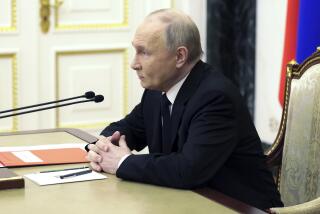Russia Ready to Talk on Union Treaty; KGB Chief Cites Urgency
- Share via
MOSCOW — The Russian Federation, the largest of the Soviet Union’s republics, agreed Tuesday to participate in drafting a new treaty binding the country together in a federal union, but it warned the central government that it would have to yield its almost total control of the economy.
The Russian Parliament, in a move that will push debates about the Soviet Union’s future forward into actual negotiations, formally declared its readiness to be “a fully fledged subject of a renewed Soviet Union on the basis of a new union treaty.”
Boris N. Yeltsin, the Russian Federation president, urged deputies to vote for the resolution, which had been delayed by the political thrust and counter-thrust of conservatives and radicals over a document that will reshape the Soviet Union as a nation. Yeltsin himself had sharply criticized the initial draft of the treaty.
“Russia, to be sure, stands for the union,” Yeltsin said. “But this should be a union based not on unitary principles but on equality and the truly free will of each republic.”
Despite Yeltsin’s warnings that Russia wanted a much different balance between the central government and the republics as well as full economic sovereignty, the Russian decision was welcome news for President Mikhail S. Gorbachev, who is battling the Soviet Union’s dismemberment by nationalists in many of its 15 constituent republics.
Faced with a major struggle next week at the Congress of People’s Deputies, the national Parliament, over the present draft of the treaty, Gorbachev sought at a meeting of the Communist Party’s leadership on Monday and Tuesday to build sufficient momentum behind his proposals to ensure their quick adoption. But he apparently failed to win the unqualified support he wanted in an often heated debate.
“Everyone says, ‘Yes, but,’ and in the ‘buts’ are very deep reservations,” a senior journalist who attended the session said Tuesday. “There are debates about substance that are quite serious, and there are debates about procedures that are in themselves quite substantive. Resolution could take years of discussion, but we do not have that time.”
The urgency of the measure was underscored Tuesday by Vladimir A. Kryuchkov, the chairman of the State Security Committee, the KGB, who warned the nation in a special television address that the country’s compound political and economic crises were now threatening its existence.
“The danger of the Soviet Union’s disintegration has developed,” Kryuchkov said. “National chauvinism has been fanned up, and mass rioting and violence are being provoked. The most terrible thing is when one’s nationality becomes a cause of death. Wrong interpretations of national sovereignty have led to a violation of human rights and real war.
“Today, the question is this--will our great state exist or not?” he said. “There is no doubt that every honest, reasonable Soviet citizen will answer decisively, ‘Yes.’ ”
Kryuchkov pledged that his forces will do their utmost to prevent the Soviet Union’s collapse and that the KGB will act to ensure the country’s transition toward democracy and “firmly guard security, legality, law and order.”
Warning that the government is prepared to crack down on those it sees disrupting social order, Kryuchkov said: “Workers of the KGB see their duty in preventing interference into our domestic affairs by foreign special services, and those foreign organizations and groups who . . . have for decades conducted and continue to conduct a secret war against the Soviet people.
“On the wave of anti-communism, there are forces striving to capture power that act through methods that are far from democratic,” Kryuchkov continued. “Some things are done deliberately to create shortages and take advantage of them, and gain political capital, too. Hence, all those loud demagogic political statements. . . .”
Kryuchkov’s appearance, following that of the defense minister and the interior minister in previous weeks, appeared intended to reassure people, notably conservatives, that the government is taking a firmer hand to deal with political and economic problems.
His comments nonetheless appeared calculated to draw the battle lines even more sharply in advance of the two-week meeting, opening Monday, of the Congress of People’s Deputies and the debate over, first, the full range of national issues and then specifically on the future of the Soviet Union and the new union treaty.
The treaty, replacing one adopted in 1922, will define relations between the Soviet Union’s constituent republics and the central government and lay a new political foundation for the country.
While four of the 15 republics have said they will refuse to sign, most of the rest have strong reservations about the draft treaty; for them, the key question is control of their economies, particularly of their natural resources. So far, no compromise has emerged.
“The major issue that is not yet resolved is drawing the line between the spheres of competence of the center and of the republics,” Nursultan Nazarbayev, the president of Kazakhstan, the third largest Soviet republic, and a possible candidate for the new position of Soviet vice president, told a news conference.
“This is particularly true of ownership--what belongs to the central government, what to the republics. . . . “
But Nazarbayev acknowledged that economic need requires the Soviet Union to remain united.
New tensions, meanwhile, were reported in the southern republic of Georgia, where the legislature abolished autonomy, given in 1922, of Southern Ossetia, a predominantly Muslim region of 98,000 people. Asserting its sovereignty, the Georgian legislature said the region, the scene of ethnic clashes over the years, will be governed by the republic’s administration.
More to Read
Sign up for Essential California
The most important California stories and recommendations in your inbox every morning.
You may occasionally receive promotional content from the Los Angeles Times.













